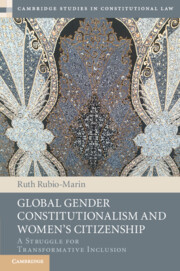Book contents
- Global Gender Constitutionalism and Women’s Citizenship
- Cambridge Studies in Constitutional Law
- Global Gender Constitutionalism and Women’s Citizenship
- Copyright page
- Dedication
- Contents
- Foreword
- Acknowledgments
- Table of Cases
- Introduction
- 1 The Constitutional Establishment of the Gender Order
- 2 Inclusive Constitutionalism and Its Limits
- 3 Participatory Constitutionalism
- 4 Transformative Gender Constitutionalism
- 5 Toward a Constitutional Gender Erasure or a Constitutional Gender Reaffirmation?
- Conclusion
- Index
Conclusion
Published online by Cambridge University Press: 29 September 2022
- Global Gender Constitutionalism and Women’s Citizenship
- Cambridge Studies in Constitutional Law
- Global Gender Constitutionalism and Women’s Citizenship
- Copyright page
- Dedication
- Contents
- Foreword
- Acknowledgments
- Table of Cases
- Introduction
- 1 The Constitutional Establishment of the Gender Order
- 2 Inclusive Constitutionalism and Its Limits
- 3 Participatory Constitutionalism
- 4 Transformative Gender Constitutionalism
- 5 Toward a Constitutional Gender Erasure or a Constitutional Gender Reaffirmation?
- Conclusion
- Index
Summary
At its inception, modern constitutionalism was superimposed on a reproductive family structure, built around marriage, which was both naturalized and romanticized. This family order crafted a specific understanding of women’s citizenships centered around the role of mother and caretaker, turning modern family law into the legal source that, de facto, most impacted women’s constitutional membership. The degrees and forms in which this family scheme and the gender roles it implied were rendered constitutionally explicit have varied across time and space, as have the ways in which they have affected women, many of whom, for various reasons (including those related to class, ethnicity, race, or sexual orientation), were not able or deemed fit to live up to its idealized standards. Yet the general acceptance of the marital family as “the foundational unit of society” (an expression that is still reproduced in multiple constitutions today) explains why all too often women’s attempts to advance toward the affirmation of equal citizenship were first resisted as challenges to the very structure of the constitutional order, rather than simply celebrated as natural steps in the gradual conquest of the vision of coexistence among naturally free human beings that enlightened and liberal theories referred to.
- Type
- Chapter
- Information
- Global Gender Constitutionalism and Women's CitizenshipA Struggle for Transformative Inclusion, pp. 329 - 339Publisher: Cambridge University PressPrint publication year: 2022

